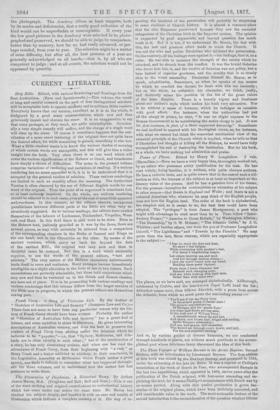The Persecution of Diocletian. A Historical Essay. By Arthur James
Mason, M.A. (Deighton and Bell ; Boll and Sons.)—This is one of the most striking and original contributions to ecclesiastical history which has come under our notice for some time. Mr. Mason has studied his subject deeply, and handles it with an ease and wealth of illustration which indicate a complete mastery of it. His way of re-
garding the incident of the persecution will probably be surprising to some students of Church history. It is almost a common-place that tiro able Emperors persecuted because they saw the essential antagonism of the Christian faith to the Imperial system. The opinion is supported by good arguments, and beyond question has much truth in it. But it is not, if we understand Mr. Mason, the fact with
this, the last and greatest effort made to crush the Church. It was not the wise and politic Diocletian who initiated the persecution. On the contrary, all his feelings were against it,—his feelings, that is, as a ruler. He was able to measure the strength of the enemy which he attacked, and ho shrank from the conflict. It was the brutal Galerius who drove him into it, and the motive of Galerius was not policy, but a base hatred of superior goodness, and the cruelty that is so closely akin to the worst sensuality. Diocletian himself Mr. Mason, so to speak, rehabilitates. Sometimes, as when he speaks of the means, by which he reached the throne, be deals with him too leniently ; but on the whole, ho estimates his character, we think, justly, and distinctly raises his position in the list of the great rulers
of the later Empire. There is a homely vigour and freshness about our author's style which makes his book very attractive. Nor is he without a sense of humour, which he indulges on occasion,
with good effect. For instance, when the authorities had put all the clergy in prison, he says, " It was no slight expense to the Roman Government to be maintaining the entire clergy in jail. It was the fret instance, in fact, of a State supported hierarchy." Sometimes we feel inclined to quarrel with his theological views, as, for instance., with what we cannot but think the somewhat mechanical view of the essential principle of the Church which is implied, when he tells us that if Diocletian had thought of killing all the Bishops, he would have fully accomplished his end of destroying the institution. But for his book,. as a whole, we have nothing but admiration and praise.


































 Previous page
Previous page